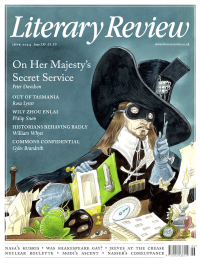Sophie Mackintosh
Do No Harm?
Butcher
By Joyce Carol Oates
Fourth Estate 352pp £16.99
Butcher, Joyce Carol Oates’s sixty-forth novel, is ostensibly the story of Silas Weir, ‘Father of Gyno-Psychiatry’ to some, the ‘Red-Handed Butcher’ to others. A 19th-century doctor at the New Jersey Asylum for Female Lunatics, Weir devotes himself to the study and experimental treatment of female maladies that nobody else wants to address. But it’s also the story of the women upon whom he conducts his brutal surgeries, most notably the deaf-mute Brigit, an Irish servant who becomes his greatest success, his assistant and the source of his downfall.
Although a fictional figure, Weir is modelled on actual doctors; the operations he performs are based on procedures inflicted on 19th-century women. The novel takes the form of a biography compiled from a range of sources (‘a chorus of witnesses’) by Weir’s son, Jonathan Franklin Weir, in 1898, ten years after the death of his father. The testimonies range from a brief account composed by Tabitha, a once-young woman Silas hoped to court, to a memoir written by Brigit and the journals of Weir himself. Jonathan himself is also never far from the text. He jumps in to contextualise, to act as a sort of foil to his father’s ‘sacred monomania’, and to clarify his purpose in composing the book, as when he stresses that he wishes to ‘present a fully shaped portrait … not a partial, condescending hagiography of the sort that has already appeared in multiple obituaries’.
One of the first images of Weir in the novel is as a tremulous suitor, an object of ridicule. Another is of him as a useless surgeon, inadvertently (and horrifyingly) killing an infant as he attempts to reshape its head with a pair of forceps, an act presented as an

Sign Up to our newsletter
Receive free articles, highlights from the archive, news, details of prizes, and much more.@Lit_Review
Follow Literary Review on Twitter
Twitter Feed
How to ruin a film - a short guide by @TWHodgkinson:
Thomas W Hodgkinson - There Was No Sorcerer
Thomas W Hodgkinson: There Was No Sorcerer - Box Office Poison: Hollywood’s Story in a Century of Flops by Tim Robey
literaryreview.co.uk
How to ruin a film - a short guide by @TWHodgkinson:
Thomas W Hodgkinson - There Was No Sorcerer
Thomas W Hodgkinson: There Was No Sorcerer - Box Office Poison: Hollywood’s Story in a Century of Flops by Tim Robey
literaryreview.co.uk
Give the gift that lasts all year with a subscription to Literary Review. Save up to 35% on the cover price when you visit us at https://literaryreview.co.uk/subscribe and enter the code 'XMAS24'